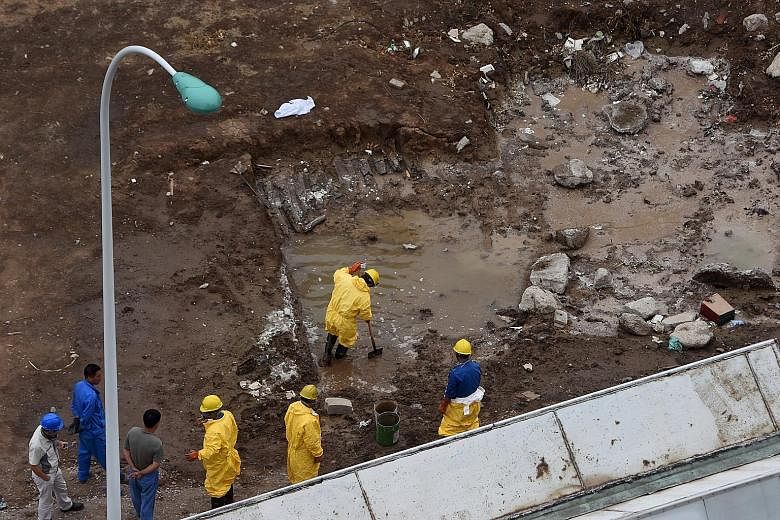BEIJING • Cyanide levels more than 350 times the standard limits have been detected in water close to the site of deadly explosions in the Chinese port city of Tianjin.
The Tianjin environmental protection bureau yesterday said the chemical was detected at 25 water-monitoring sites within the cordoned-off area around the blast site last Wednesday. "An excessive level of cyanide was detected in eight locations, with the highest reaching 356 times" the permitted level.
However, although cyanide levels in the river, sea and waste water in the evacuated area have risen sharply since the deadly blasts, drinking water in Tianjin apparently met national standards, according to a separate statement from the health authorities on Tuesday.
Yesterday, China's ruling Politburo Standing Committee called on all levels of government to do more to implement and monitor industrial safety rules, the official Xinhua news agency reported.
"Recently, there's been a series of serious accidents in certain places, once again exposing grave safety risks," Xinhua quoted from a special meeting called by President Xi Jinping to address the Tianjin blasts.
-
2,500
Tonnes of 40 types of dangerous goods were being held in the warehouses . They comprised:
1,300
Tonnes of potentially explosive oxidising chemicals, including ammonium nitrate and potassium nitrate.
500
Tonnes of flammables, including sodium and magnesium.
700
Tonnes of deadly poisons, mainly sodium cyanide.
The government has confirmed that there were about 700 tonnes of the deadly chemical sodium cyanide in the warehouse that blew up last week. Thousands of residents had to evacuate the area after toxic chemicals were released in the explosions, which killed 114 people.
The local government, under pressure from Beijing to improve industrial safety, said it would relocate chemical plants.
Tianjin, the world's 10th-busiest port, will relocate chemical plants from the Tianjin Binhai New Area where the blasts occurred to the Nangang Industrial Zone, 25km away, according to China Daily, citing Tianjin Mayor Huang Xingguo.
The Communist Party's anti- graft watchdog promised to crack down on corruption and on those responsible for violating laws and regulations which had led to the explosions, but stressed the importance of maintaining political stability, according to a statement on the Central Commission for Discipline Inspection website yesterday.
State media on Wednesday blamed executives of Ruihai, which owns the chemical warehouses, for the disaster, saying they used connections to obtain fire safety and environmental approvals.
The Tianjin government has determined that the warehouses contained 2,500 tonnes of 40 types of dangerous goods, Xinhua said.
There were 1,300 tonnes of potentially explosive oxidising chemicals, including ammonium nitrate and potassium nitrate, 500 tonnes of flammables, including sodium and magnesium, and 700 tonnes of deadly poisons, mainly sodium cyanide.
Apartments and a railway station were also closer to the warehouse than allowed by rules on proximity of dangerous materials to dwellings.
The Tianjin government said it would conduct third-party assessments to determine whether to buy back some of the estimated 17,000 apartments damaged by the blasts, after residents demanded the government either provide compensation or buy back their property.
"Apartments that should be torn down will be torn down, apartments that need to be rebuilt will be rebuilt, apartments that need to be repurchased will be repurchased," said Vice-Mayor Zong Guoying.
REUTERS, AGENCE FRANCE-PRESSE

